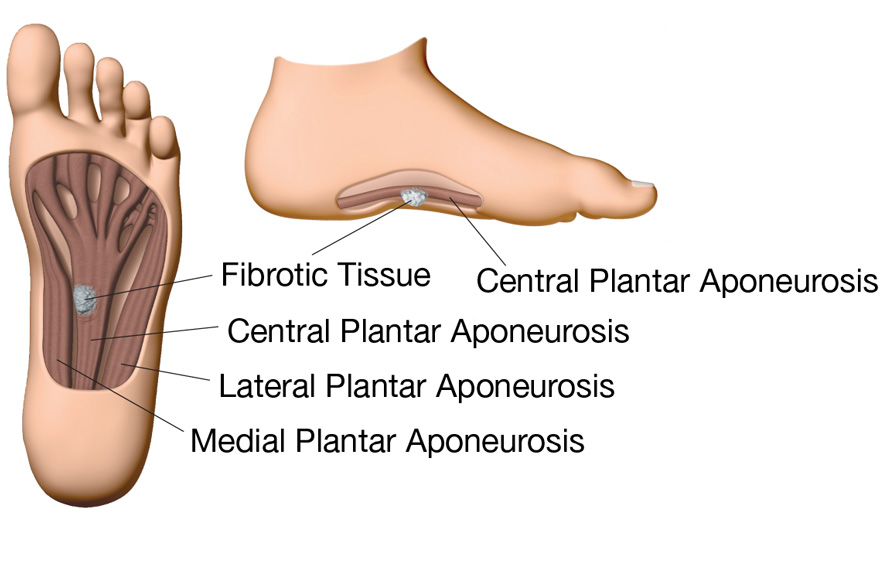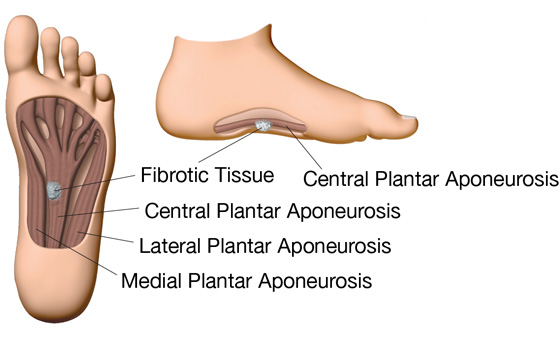 Contact Us
Contact UsPlantar fibromatosis is a fibrotic tissue disorder or wound healing disorder, which is non-cancerous and is characterized by the presence of excess collagen or fibrotic tissue. The most common symptoms of plantar fibromatosis are firm nodular masses that can be felt just under the skin on the bottom of the foot and pain when standing or walking. Unlike the related condition Peyronie's disease, plantar fibromatosis nodules are not known to resolve on their own. Studies indicate that plantar fibromatosis is diagnosed most often in the middle-aged and elderly population, although it can affect people of all ages. It has been found that the incidence may be as high as 25% in the middle-aged and elderly population and that the condition affects men approximately 10 times more often than women*. Caucasians of northern European descents tend to be affected more than other ethnicities.
Plantar fibromatosis is a fibrotic tissue disorder of the plantar fascia that consists of excess collagen or fibrotic tissue. The excess collagen is commonly referred to as a fibroma. It is most commonly located in the arch of the foot in a tissue layer called the plantar aponeurosis. The two most common symptoms of plantar fibromatosis are firm nodules that can be felt just under the skin and pain that can be constant or increases when standing or walking. Plantar fibromas often increase in size and density over time but not indefinitely.




An exact cause of plantar fibromatosis is unknown; however, there are some potential causes that most doctors agree may play a role in the condition.
Trauma to the plantar fascia is thought to be a primary cause of plantar fibromatosis. The trauma may be from a puncture through the bottom of the foot or from repetitive impact from activities such as running or climbing. It is also thought that thickening and tightening of the plantar fascia caused by plantar fasciitis may lead to tears in the tissue, causing plantar fibromas to occur.
Many patients may be genetically predisposed to fibrotic tissue disorders such as plantar fibromatosis. People of northern European descent appear to have a higher incidence of fibrotic diseases, while they rarely affect Asians. People with plantar fibromatosis may also have a parent or a close relative with the condition. The condition is also associated with Peyronie's disease and Dupuytren's disease. About 5% of patients with Dupuytren's disease also have plantar fibromatosis, and 3% of patients with Dupuytren's disease will have Peyronie's disease.
Medications often used for treating high blood pressure that belong to the drug class known as beta adrenergic blocking agents (beta-blockers) have been reported to cause fibrotic tissue disorders. Anti-seizure medications such as phenytoin and certain supplements such as glucosamine/chondroitin and large doses of supplemental vitamin C may also promote the production of excess collagen.
A higher rate of plantar fibromatosis has been found among patients with conditions such as chronic liver disease, diabetes, and seizure disorders*. While these conditions may not be a direct cause of the condition, it may indicate the impact these conditions or medications used to treat them have on wound healing. Long-term alcohol abuse has also been associated with the condition.
Many different treatments for plantar fibromatosis have been used and can be divided into two major categories, invasive and noninvasive.
Most doctors agree that a non-invasive approach to treating plantar fibromatosis should be considered first given the high rate of recurrence from surgery. Invasive treatments and surgery are usually reserved for the most severe cases.